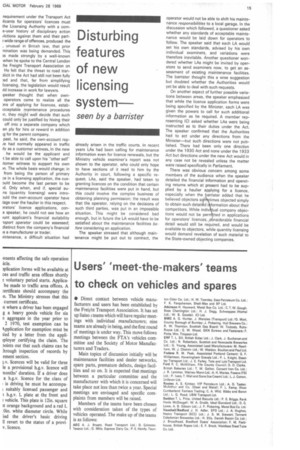Disturbing features of new licensing system
Page 17

If you've noticed an error in this article please click here to report it so we can fix it.
seen by a barrister
requirement under the Transport Act ■ ficants for operators' licences must the Licensing Authority with a come-year history of disciplinary action iictions against them and their partwide range of offences, produced the , unusual in British law, that prior mination was being demanded. This is made strongly by a well-known when he spoke to the Central London :he Freight Transport Association on He felt that the threat to road tran in the Act had still not been fully :ed and that, far from simplifying licensing, the legislation would result iId increase in work for lawyers.
;peaker thought that when ownoperators came to realize all the )ns of applying for licences, estabicceptable maintenance procedures In, they might well decide that such could only be justified by hiving their off into a separate company which en ply for hire or reward in addition 1g for the parent company.
past, he said, the own-account rep,e had normally appeared in traffic ily as a customer witness. In the new he would be the applicant and t be able to call upon his "other self' tomer witness to support his own in. The whole basis would change; in from being the person of primary in a licensing application, the cusduld become the last person to be id, Only when, and if, special auns (quantity licensing) were intro)uld the own-account operator have tage over the haulier in this respect. Rrators' licence applications, cone speaker, he could not see how an runt applicant's financial suitability wort operator could be assessed; distinct from the company's financial is a manufacturer or trader,
iintenance, a difficult situation had
already arisen in the traffic courts. In recent years LAs had been calling for maintenance information even for licence renewals, but the Ministry vehicle examiner's report was not shown to the operator, who could only hope to have sections of it read to him by the Authority in court, following a specific request. LAs, said the speaker, had taken to granting licences on the condition that certain maintenance facilities were put in hand, but this could involve the complex business of obtaining planning permission; the result was that the operator, relying on the decisions of such third parties, was put in an impossible situation. This might be considered bad enough, but in future the LA would have to be satisfied about the maintenance facilities before considering an application.
The speaker stressed that although maintenance might be put out to contract, the operator would not be able to shift his maintenance responsibilities to a local garage. In the discussion which followed, a questioner asked whether any standards of acceptable maintenance would be laid down for operators to follow. The speaker said that each LA would set his own standards, advised by his own individual examiners, and variations were therefore inevitable. Another questioner wondered whether LAs might be invited by operators to send examiners now, to get an assessment of existing maintenance facilities. The barrister thought this a wise suggestion but doubted whether the Authorities would yet be able to deal with such requests.
On another aspect of further possible variations between areas, the speaker emphasized that while the licence application forms were being specified by the Minister, each LA was given the powers to call for such additional information as he required. A member representing ICI asked whether LAs were being instructed as to their duties under the Act. The speaker confirmed that the Authorities had to act under any directions from the Minister—but such directions were not published. There had been only one direction under the 1930 Act and none under the 1933 Act but directions under the new Act would in any case not be revealed unless the matter were raised specifically in Parliament.
There was obvious concern among some members of the audience when the speaker detailed the financial information and operating returns which at present had to be supplied by a haulier applying for a licence, especially when the barrister added that he believed objectors sqrtimes objected simply to obtain such detail 4d i formation about their competitors. While indiv ual company objections would not be per tted in applications for operators' licences, riónsiderable financial detail would still be required, and would be available to objectors, while quantity licensing would demand revelation of such material to the State-owned objecting companies.








































































































